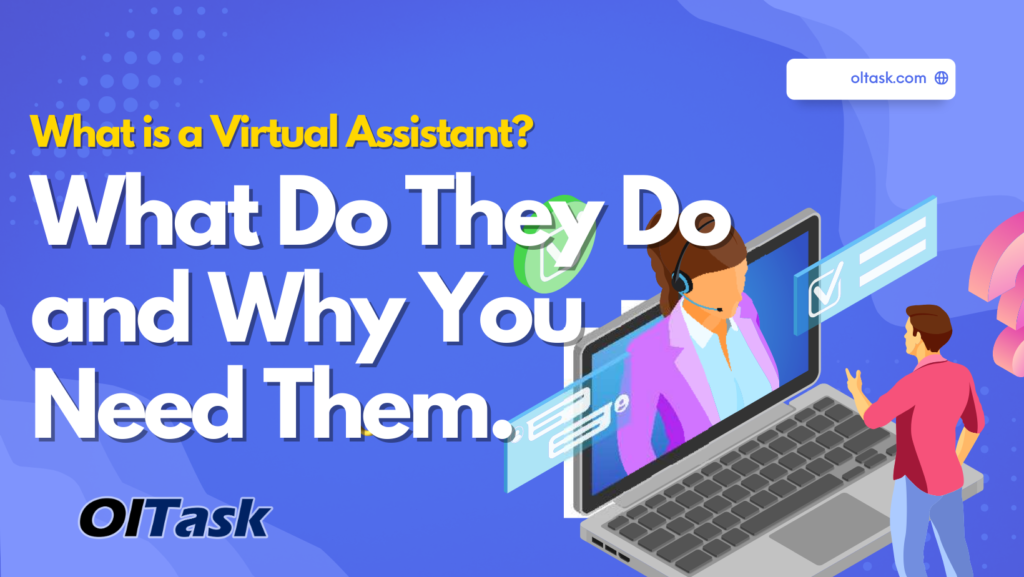What is a Virtual Assistant and What Do They Do?

Today, the digital revolution offers businesses a myriad of opportunities to grow, innovate, and most importantly, go global. With this newfound global reach, comes a unique set of challenges. Enter the “virtual assistant” – the 21st-century solution for businesses looking to streamline operations, improve customer service, and optimize their administrative tasks.
But what exactly is a virtual assistant, and what do they do?
What is a Virtual Assistant?

A virtual assistant (VA) is more than just a remote worker; they’re a business owner’s right hand. Specializing in a range of tasks, from scheduling meetings and managing emails to mastering voice commands with tools like Google Assistant and Google Home, a VA is the epitome of versatility. Many embark on this virtual assistant job from their home, making it one of the sought-after home jobs today.
Whether handling a client’s social media, offering customer service, or providing administrative support like scheduling appointments, their skills are vast. Their training, often encompassing communication skills and proficiency in tools, equips them for diverse roles. As technology advances with conversational AI and voice assistants, VAs continually evolve, ensuring they stay at the forefront of the virtual assistance realm, always ready to cater to a potential client’s specific needs with utmost efficiency.
Why Hire a Virtual Assistant?
From flexibility to tapping into a global talent pool, the reasons are numerous. Businesses that embrace the VA model position themselves for both immediate benefits and future growth. In the age of digital transformation, the relevance and impact of virtual assistants cannot be understated. Here’s why:
- Skill Diversity: Today’s VAs come equipped with a broad spectrum of skills. From handling your social media to offering top-notch customer service, their capabilities extend beyond the traditional administrative task. Whether you need graphic design, voice command expertise with tools like Google Home, or efficient scheduling of meetings, there’s a VA out there tailored for your needs.
- Flexibility and Efficiency: Virtual assistants offer flexibility like no other. Their remote job allows them to cater to varied time zones and needs, ensuring your business is always ticking. Their virtual assistant training ensures tasks are done efficiently, saving you time.
- Cost-Effective Solution: The overhead costs associated with traditional hires are circumvented with VAs. No office space, no added utilities. You pay for the service and skills, and nothing more.
- Ease of Communication: With advances in conversational AI and tools designed for remote work, liaising with your VA has never been easier. Whether through a simple phone call or using voice assistants for specific tasks, communication is seamless.
Diverse Roles of a Virtual Assistant

Virtual assistants are the unsung heroes of the business realm, seamlessly blending into numerous roles. Their multifaceted expertise means they can juggle various tasks with adeptness. Let’s delve into the myriad roles a VA can play:
Administrative Aces
- Task Masters: From scheduling meetings, managing emails, to handling voice commands with tools like Google Home, they streamline administrative tasks, ensuring the business runs smoothly.
- Personal Assistant Prowess: Need someone to manage your itinerary or handle client communication? VAs fit perfectly into personal assistant roles, making sure the intricacies of your day are well-orchestrated.
Digital Dynamo
- Social Media Strategists: With the digital age in full swing, a VA skilled in social media can curate content, manage campaigns, and engage audiences effectively.
- Graphic Design Gurus: Some VAs come with a knack for design, ready to jazz up your marketing materials or website graphics.
Communication Connoisseurs
- Customer Service Stars: VAs are often the frontline in customer interaction, handling inquiries, feedback, or even potential client concerns.
- Voice Assistant Virtuosos: As conversational AI grows, VAs adept in tools like Google Assistant can optimize business interactions, creating a seamless interface for clients.
Specialized Skill Sets
- Remote Job Specialists: With the rise of remote work, VAs are often attuned to the best practices of virtual assistance, ensuring tasks are executed efficiently from any corner of the globe.
- Executive Assistants: For business owners seeking a right hand, VAs step in, managing higher-level tasks, from project management to liaising with stakeholders.
How to Choose the Right Virtual Assistant for Your Business

Navigating the vast ocean of virtual assistants available can be daunting. As a business owner, you must find the right fit, ensuring efficiency and alignment with your vision. Here’s a step-by-step guide to help you on this journey:
Define Your Needs
- Task Identification: Start by listing specific tasks you need assistance with. Is it scheduling meetings, managing social media, or perhaps graphic design? Know what you seek.
- Skill Requirement: With the list in hand, determine the skills necessary. If you’re delving into conversational AI or using tools like Google Assistant, having a VA with tech-savvy prowess is essential.
Research and Recommendations
- Reviews and References: Dive into the virtual assistant’s reviews or ask for references. Fellow business owners might have recommendations, providing insights into a VA’s skill set and reliability.
- Virtual Assistant Services: Platforms that offer virtual assistance services often vet their VAs, giving you a layer of assurance about their proficiency.
Interviewing Process
- Communication Skills Test: A phone call or video interview can reveal much about a VA’s communication skills and their fit within your company culture.
- Task Trial: Before fully onboard, you might want to give a small task. This not only gauges their competence but also their approach to a specific task or project.
Training and Onboarding
- Orientation: Every business is unique. Take time to introduce your VA to your business, ethos, and the tools you use, whether that’s scheduling software or Google Home.
- Ongoing Training: Encourage your VA to continue their virtual assistant training. This investment will ensure they stay updated, bringing the latest skills and tools to your business.
Common Myths and Misconceptions about Virtual Assistants

Many believe VAs only handle clerical tasks or that they’re hard to communicate with. These misconceptions couldn’t be further from the truth. In fact, with proper management and clear communication, a VA can be just as, if not more, efficient than in-office staff.
Myth 1: Limited Skills
Contrary to the belief that VAs predominantly handle administrative tasks, like scheduling appointments, they often possess a diverse skill set. From managing social media campaigns to providing customer service or mastering tools like Google Home, their capabilities are expansive.
Myth 2: Lack of Professionalism
Many believe that since VAs work from home, they lack professionalism. However, serious VAs often undergo rigorous virtual assistant training, ensuring that their remote job is executed with utmost professionalism and dedication.
Myth 3: Communication Barriers
The fear of miscommunication in remote work is often cited, but with advancements like conversational AI and voice assistants, the bridge between client and VA has never been more sturdy, ensuring clarity and understanding in dialogues.
Myth 4: One Size Fits All
Some assume all VAs perform the same generic tasks. The truth is, VAs often specialize in varied fields – be it executive assistance, graphic design, or specialized customer service, each VA brings something unique to the table.
Myth 5: Too Expensive for Small Businesses
The belief that hiring a VA is a luxury only large corporations can afford is a misnomer. Many VAs offer scalable solutions, allowing small business owners to select services that align with their budget and needs.
Training and Skills of a Virtual Assistant

In today’s digital landscape, virtual assistants (VAs) have become essential assets for businesses and individuals alike. Their multifaceted skill set and ability to handle various tasks remotely have made them indispensable in the fast-paced world we live in. However, even though VAs come with a wide range of skills, specialized training programs have emerged to specifically cater to the virtual assistance market. By participating in these programs, virtual assistants can ensure they are always at the top of their game.
The Role of Specialized Training Programs for Virtual Assistants
- Focused Skill Development: These programs offer targeted training in various areas, such as social media management, conversational AI, customer service, administrative tasks, graphic design, and executive assistance. By honing their expertise in specific fields, VAs become capable of handling specialized tasks efficiently.
- Adapting to New Technologies: With voice assistants like Google Assistant and Google Home gaining popularity, virtual assistants must stay up-to-date with voice command technology. Training programs provide VAs with the knowledge and skills to effectively integrate voice commands into their workflow, enhancing their productivity.
- Enhancing Communication Skills: Communication is key when interacting with clients and potential clients. Training programs emphasize effective communication techniques, enabling VAs to build strong relationships with clients, resolve conflicts, and deliver exceptional customer service.
Benefits of Specialized Training for Virtual Assistants
- Increased Professionalism: Specialized training instills professionalism and gives VAs the confidence to handle tasks and clients with excellence.
- Competitive Edge: By acquiring specialized skills, VAs can differentiate themselves in the market, attracting more clients and securing better-paying opportunities.
- Expanded Service Offerings: Specialized training equips VAs with the ability to offer a wider range of services, such as scheduling appointments, organizing meetings, and providing administrative support, making them indispensable to busy professionals and business owners.
- Remote Work Opportunities: Training programs also assist VAs in tapping into remote job opportunities, allowing them to work from the comfort of their homes while still supporting clients effectively.
Tools and Technologies Powering Today’s Virtual Assistants

The virtual assistant (VA) of today is a versatile and indispensable tool for remote work. With a suite of tools and skills at their disposal, they can seamlessly handle tasks, connect with clients, and ensure smooth communication. From Trello for task management to Zoom for face-to-face meetings, virtual assistants are equipped to handle it all.
- Efficient Task Management: Virtual assistants can use tools like Trello to manage tasks, assign deadlines, and track progress. This ensures that projects stay on track and no details fall through the cracks.
- Seamless Communication: Whether it’s through social media, email, or phone calls, virtual assistants excel in customer service and communication skills. They can interact with clients and potential clients, ensuring prompt and effective responses to inquiries.
- Conversational AI: With the rise of conversational AI and voice assistants like Google Assistant and Amazon Alexa, virtual assistants are well-versed in using these technologies to optimize their workflow. They can take advantage of voice commands to perform administrative tasks efficiently.
- Wide Range of Skills: Virtual assistants have diverse skill sets that go beyond administrative tasks. They can offer support in graphic design, social media management, and even executive assistance. This makes them valuable assets for any business owner looking to delegate various tasks.
- Virtual Assistant Training: Virtual assistants undergo rigorous training to refine their abilities and stay up-to-date with the latest industry trends. They continuously enhance their virtual assistant skills to provide top-notch virtual assistant services.
- Remote Work Enabled: The virtual assistant job is perfectly suited for remote work. With the ability to work from home or any location, virtual assistants bring flexibility and convenience to their clients.
- Personal Assistant Experience: Virtual assistants excel at scheduling appointments and handling specific tasks delegated to them. With their knowledge of tools such as Google Home and voice assistants, they can efficiently manage calendars and ensure meetings run smoothly.
The Return on Investment (ROI) of Hiring a Virtual Assistant

Are you a busy business owner looking to streamline your operations and boost productivity? Look no further than hiring a virtual assistant (VA). Virtual assistants are trained professionals who can provide administrative support remotely, allowing you to focus on what truly matters – growing your business. Let’s explore the tangible benefits of hiring a VA and how they can positively impact your bottom line.
Reduced Overhead Costs
- Hiring a full-time, in-house employee comes with various costs such as employee benefits, office space, and equipment. By choosing a virtual assistant, you eliminate these expenses, leading to significant savings.
- Virtual assistants typically charge on an hourly basis or per project, giving you the flexibility to scale your investment as per your business requirements.
Increased Efficiency
- Virtual assistants possess a wide range of skills, including administrative support, customer service, scheduling appointments, and even graphic design. They can tackle a variety of tasks, helping you save time and enabling you to focus on more critical aspects of your business.
- With their exceptional communication skills, virtual assistants can handle phone calls and interact with potential clients, providing a professional image for your business.
Freedom to Focus on Growth
Mundane and repetitive tasks can take up valuable time that could be better spent on developing your business and pursuing growth opportunities. By outsourcing these tasks to a virtual assistant, you free up your schedule and direct your energy towards strategic activities that drive revenue and expansion.
Adapting to New Technology
Virtual assistants are well-versed in conversational AI and voice commands, which are becoming increasingly popular in today’s digital landscape. They can utilize platforms such as Google Assistant or voice assistants like Google Home to perform tasks seamlessly, ensuring efficiency and effectiveness.
Cost-Effective Training and Support
Traditional hiring processes often require extensive training and onboarding costs. With virtual assistants, they come equipped with the necessary skills and experience to handle administrative tasks right from the start. This saves you valuable time and resources while still receiving the professional support you need.
Overcoming Challenges: Best Practices for Managing a Virtual Assistant

In today’s fast-paced business world, many entrepreneurs and professionals are turning to virtual assistants (VAs) for help with various tasks. Whether it’s scheduling appointments, providing customer service, managing social media accounts, or handling administrative tasks, VAs offer valuable support that can significantly increase productivity and efficiency.
The key to success when working with a virtual assistant boils down to two crucial aspects: clear communication and setting expectations. Let’s explore how these factors contribute to a productive partnership:
- Regular Check-Ins: Establishing a consistent line of communication with your VA is vital. Regular check-ins, whether through email, phone calls, or video conferences, allow you to discuss ongoing projects, provide feedback, and address any concerns.
- Effective Collaborative Tools: Utilizing collaborative tools such as project management software or communication platforms ensures seamless communication. These platforms enhance real-time interaction, keeping everyone on the same page and fostering collaboration.
- Understanding Challenges: Virtual assistants face unique challenges, such as working remotely and managing multiple client demands. By showing empathy and understanding their challenges, you can cultivate a supportive and productive working relationship.
- Defining Task Specifics: Clearly communicate your expectations regarding the specific tasks you need assistance with. Provide detailed instructions, deadlines, and desired outcomes to ensure your VA understands your needs.
- Virtual Assistant Training: If you require specialized skills from a VA, it’s essential to ensure they have the necessary training or experience. Provide training resources or be open to discussing any learning opportunities that enhance their qualifications.
- Regular Feedback: Regularly providing constructive feedback enables your VA to understand areas where they excel and where they can improve. Celebrate successes and address any areas that may need adjustment promptly.
Get Your Business On Track Today

If you’re ready to harness the power of virtual assistance and revolutionize the way you do business, OlTask is here to help. Our dedicated virtual assistant services are tailored to meet your specific needs, ensuring optimal growth and efficiency for your enterprise. Don’t navigate the digital future alone. Reach out to OlTask today and discover the perfect virtual assistant match for your business.